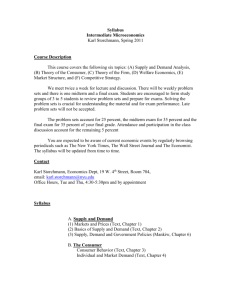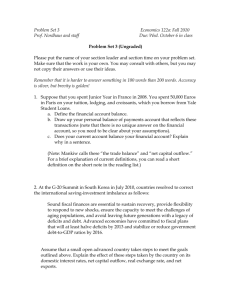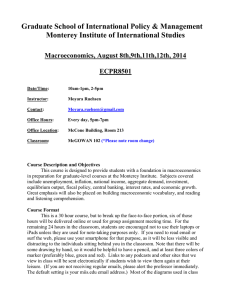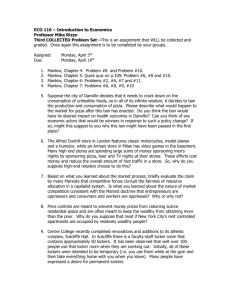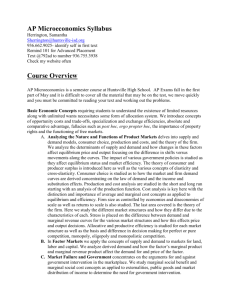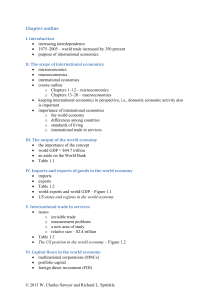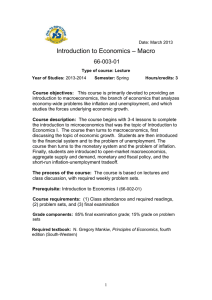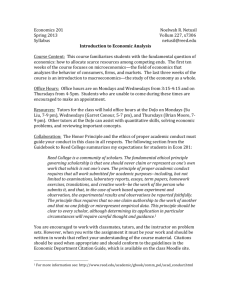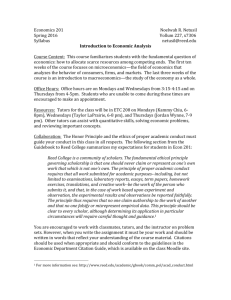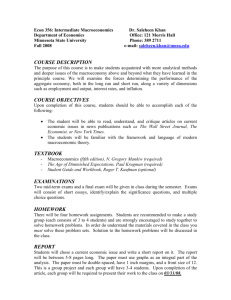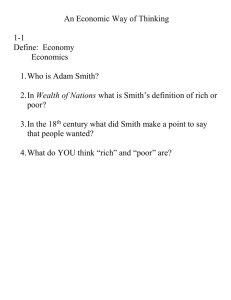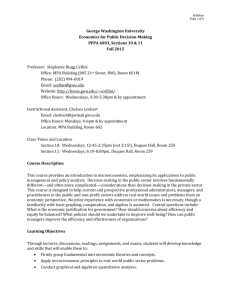course requirements
advertisement
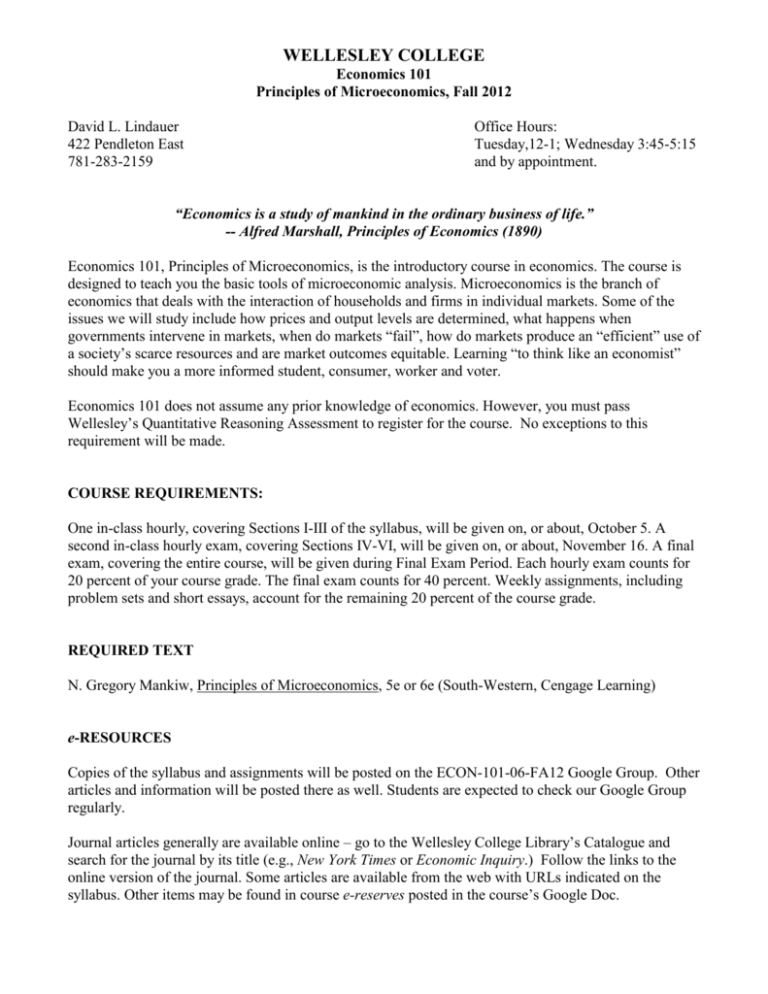
WELLESLEY COLLEGE Economics 101 Principles of Microeconomics, Fall 2012 David L. Lindauer 422 Pendleton East 781-283-2159 Office Hours: Tuesday,12-1; Wednesday 3:45-5:15 and by appointment. “Economics is a study of mankind in the ordinary business of life.” -- Alfred Marshall, Principles of Economics (1890) Economics 101, Principles of Microeconomics, is the introductory course in economics. The course is designed to teach you the basic tools of microeconomic analysis. Microeconomics is the branch of economics that deals with the interaction of households and firms in individual markets. Some of the issues we will study include how prices and output levels are determined, what happens when governments intervene in markets, when do markets “fail”, how do markets produce an “efficient” use of a society’s scarce resources and are market outcomes equitable. Learning “to think like an economist” should make you a more informed student, consumer, worker and voter. Economics 101 does not assume any prior knowledge of economics. However, you must pass Wellesley’s Quantitative Reasoning Assessment to register for the course. No exceptions to this requirement will be made. COURSE REQUIREMENTS: One in-class hourly, covering Sections I-III of the syllabus, will be given on, or about, October 5. A second in-class hourly exam, covering Sections IV-VI, will be given on, or about, November 16. A final exam, covering the entire course, will be given during Final Exam Period. Each hourly exam counts for 20 percent of your course grade. The final exam counts for 40 percent. Weekly assignments, including problem sets and short essays, account for the remaining 20 percent of the course grade. REQUIRED TEXT N. Gregory Mankiw, Principles of Microeconomics, 5e or 6e (South-Western, Cengage Learning) e-RESOURCES Copies of the syllabus and assignments will be posted on the ECON-101-06-FA12 Google Group. Other articles and information will be posted there as well. Students are expected to check our Google Group regularly. Journal articles generally are available online – go to the Wellesley College Library’s Catalogue and search for the journal by its title (e.g., New York Times or Economic Inquiry.) Follow the links to the online version of the journal. Some articles are available from the web with URLs indicated on the syllabus. Other items may be found in course e-reserves posted in the course’s Google Doc. I. Introduction (September 4-11) Mankiw, Chapters 1, 2 (+ Appendix) A. Goolsbee, “Why People Hate Economists (and Why We Don’t Care),” (August 2006) L. Summers, “Morning Prayers Address,” Appleton Chapel, Harvard University (September 15, 2003); http://ksghome.harvard.edu/~lsummer/speeches/2003/prayer.html S. Landsburg, “Click, Clack, and Car Talk,” Slate (January 30, 2002); http://www.slate.com/articles/arts/everyday_economics/2002/01/click_clack_and_car_talk.html II. Supply and Demand (September 12-18) Mankiw, Chapter 4 K. Case, “The value of scalping,” The Boston Globe (January 21, 2007) P. Conkling, “The Great Silent Lobster Tie Up,” The Working Waterfront (July 2012); http://www.workingwaterfront.com/columns/The-Great-Silent-Lobster-Tie-Up/14924/ M. Munger, “They Clapped: Can Price-Gouging Laws Prohibit Scarcity?” (January 8, 2007); http://www.econlib.org/library/Columns/y2007/Mungergouging.html# G. Becker, “Should the Purchase and Sale of Organs for Transplant Surgery be Permitted?” Capital Ideas (April 2006); http://www.chicagobooth.edu/magazine/spr06/YJ_44-47_Front.pdf D. Hemenway, "Economics of Childhood Immunizations," Economic Inquiry, Vol. 32 (July 1994) R. Freeman, “It’s Better Being an Economist (But Don’t Tell Anyone),” Journal of Economic Perspectives 13:3 (Summer 1999) III. Ceilings, Floors and Taxes (September 19-October 5) Mankiw, Chapters 5, 6, 12 D. Hall and D. Cooper, “How raising the federal minimum wage would help working families and give the economy a boost,” Economic Policy Institute (August 2012); http://www.epi.org/publication/ib341-raising-federal-minimum-wage/ M. Saltsman, “The impact of a $9.80 Federal minimum wage,” Employment Policies Institute (July 2012); http://epionline.org/studies/EPI_TheImpactof980FederalMinimumWage.pdf 2 “Ways and Means: Harvard’s Wage Debate,” Harvard Magazine 104:2 (November-December 2001); http://www.harvardmagazine.com/on-line/110182.html R. Shorto, “Going Dutch: How I Learned to Love the European Welfare State ...,” New York Times (May 3, 2009) IV. Market Efficiency and Market Failure (October 12-23) Mankiw, Chapters 7, 8, 10, 11 M. Sandel, “Jumping the Queue,” What Money Can’t Buy (2012), pp. 17-41 M. Kranish, “A clean air revival,” Boston Globe (October 17, 2010) [G-Doc] P. Krugman, “Building a Green Economy,” New York Times (April 5, 2010) “Doffing the cap,” The Economist (June 14, 2007) “Schools Brief: State and Market,” The Economist (February 17, 1996) [G-Doc] J. Tierney, “A Tale of Two Fisheries,” New York Times (August 27, 2000) L. Neyfakh, “The Matchmaker: The Harvard economist who stopped just studying the world and began trying to fix it.” The Boston Globe (April 3, 2011) V. The Theory of the Firm (October 24–31) Mankiw, Chapter 13 R. Roberts, “The Ultimate Chain letter,” Hoover Digest (2005); http://www.invisibleheart.com/top_ten/ R. Roberts and W. Poley, “Knowledge Deficit,” Wall Street Journal ECONOBLOG (September 21, 2005); http://online.wsj.com/public/resources/documents/econoblog0921.htm VI. Perfect Competition (November 2-9) Mankiw, Chapters 14 L. Read, “I, Pencil” The Freeman (reprinted May 1996, first published 1958); http://www.commonsenseeconomics.com/Readings/I.Pencil2006.FEE.pdf?nid=316 T. Buchholz, “The Second Coming of Adam Smith,” Chapter II, New Ideas from Dead Economists (New American Library: 1989), pp. 19-41 [G-Doc] 3 VII. Industrial Organization (November 13–30) Mankiw, Chapters 15, 16, 17 “Slackers or pace-setters?” The Economist (May 20, 2004) T. Wu, “In the Grip of the New Monopolists,” The Wall Street Journal (November 13, 2010) VIII. Consumer Behavior (December 4-5) Mankiw, Chapter 21, 22 pp. 480-85 J. K. Galbraith, The Affluent Society (1958), Chapter X, Section III & IV, Chapter XI [G-Doc] F. Hayek, "The Non Sequitur of the Dependence Effect", Southern Economic Journal (1961) [G-Doc] N. Carlsson-Paige and D. Levin, "Saturday Morning Pushers: Where Do Consumer Preferences Come From?" in Dollars and Sense, Real World Micro (5th Edition) [G-Doc] IX. Inequality and Poverty (December 7-11) Mankiw, Chapter 20 C. Crook, “The Height of Inequality,” The Atlantic Monthly (September 2006) P. Krugman, “For Richer,” New York Times (October 20, 2002) J. Cassidy, “Relatively Deprived: How poor is poor?” The New Yorker (April 3, 2006); http://www.newyorker.com/archive/2006/04/03/060403fa_fact P. Tough, “What Does Obama Really Believe In?” New York Times (August 15, 2012) 4
